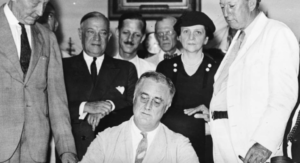Defounding America
May 2021
Features May 2021
Defounding America
On the erosion of American freedoms.
by Myron Magnet
President Franklin Delano Roosevelt signs the Social Security Bill, August 14, 1935. Photo: Library of Congress.
To gauge how unbridgeable the gulf is that divides the American Left from the Right, rewind to February 19, 2009, when those who eventually elected Donald Trump first made their voices heard. As Washington jury-rigged fixes for the Great Financial Crisis, the CNBC broadcaster Rick Santelli shouted across the Chicago Mercantile Exchange floor, “How many of you people want to pay for your neighbor’s mortgage that has an extra bathroom and can’t pay their bills?” The Merc traders roared their televised veto across the land.
Their cry was more visceral than a policy disagreement. The traders, self-made men, had worked hard for what they had and scorned having their taxes hiked to save homebuyers with imprudently high mortgages from foreclosure. “This is America!” Santelli urged, and what the new Obama administration was doing was un-American. Didn’t the Founding Fathers establish the federal government to guarantee one’s freedom to better one’s condition, and to protect the property one industriously earns—not to redistribute it?
That’s why Santelli added that he was planning a Chicago Tea Party, an update of Boston’s 1773 event. He and the traders felt the same outrage George Washington had felt about the Stamp Act and the tea tax: it was as lawless as Parliament picking his pocket. To the new-era Tea Partiers, taxation for redistribution, rather than for common purposes, is tyranny, not government by consent.
But, though the traders and Tea Partiers didn’t quite understand it, the federal government long ago had turned from the shield of individual liberty into a vast engine of redistribution. That transformation could occur because the Framers’ Constitution was body-snatched by the doctrine of the “living constitution,” which—as Woodrow Wilson first formulated it—saw the Supreme Court sitting as a permanent Constitutional Convention, making up laws as it went along, heedless of the 1787 scheme’s checks. Franklin Roosevelt’s New Deal used Wilson’s doctrine as a license to remake America’s economy and society. Once the Supreme Court buckled to FDR’s threat to pack it and started voting his way, the justices allowed an utterly foreign governmental structure to devour the Framers’ republic from within, until it broke out of the shell as something altogether different. Continue reading



